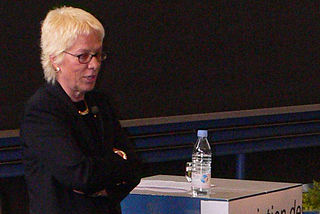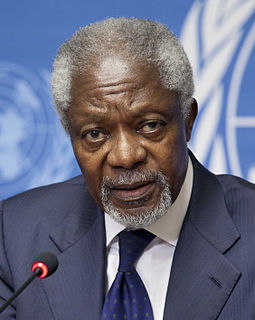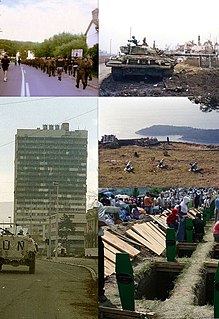
The International Tribunal for the Prosecution of Persons Responsible for Serious Violations of International Humanitarian Law Committed in the Territory of the Former Yugoslavia since 1991, more commonly referred to as the International Criminal Tribunal for the former Yugoslavia (ICTY), was a body of the United Nations established to prosecute serious crimes committed during the Yugoslav Wars, and to try their perpetrators. The tribunal was an ad hoc court located in The Hague, Netherlands.

United Nations Security Council resolution 827, adopted unanimously on 25 May 1993, after reaffirming Resolution 713 (1991) and all subsequent resolutions on the topic of the former Yugoslavia, approved report S/25704 of Secretary-General Boutros Boutros-Ghali, with the Statute of the International Tribunal as an annex, establishing the International Criminal Tribunal for the former Yugoslavia (ICTY).

United Nations Security Council Resolution 1915, adopted unanimously on March 18, 2010, after recalling resolutions 827 (1993), 1581 (2005), 1597 (2005), 1613 (2005), 1629 (2005), 1660 (2006), 1668 (2006), 1800 (2008), 1837 (2008), 1849 (2008), 1877 (2009) and 1900 (2009), the Council, acting under Chapter VII of the United Nations Charter, allowed a temporary increase in judges at the International Criminal Tribunal for the former Yugoslavia (ICTY) to serve beyond the expiry of their term of office to enable them to complete work on cases in which they were involved.

United Nations Security Council resolution 1166, adopted unanimously on 13 May 1998, after recalling Resolution 827 (1993), the Council established a third trial chamber at the International Criminal Tribunal for the former Yugoslavia (ICTY).

United Nations Security Council resolution 1191, adopted unanimously on 27 August 1998, after recalling resolutions 808 (1993), 827 (1993) and 1166 (1998), the Council forwarded a list of nine nominations for judges at the International Criminal Tribunal for the former Yugoslavia (ICTY) to the General Assembly for consideration.

United Nations Security Council resolution 1329, adopted unanimously on 30 November 2000, after recalling resolutions 827 (1993) and 955 (1994), the Council enlarged the appeals chambers at both the International Criminal Tribunal for Rwanda (ICTR) and the International Criminal Tribunal for the former Yugoslavia (ICTY), proposed the election of two additional judges at the ICTR and established a pool of ad litem judges at the ICTY.

United Nations Security Council Resolution 1931, adopted unanimously on June 29, 2010, after recalling resolutions 827 (1993), 1581 (2005), 1597 (2005), 1613 (2005), 1629 (2005), 1660 (2006), 1668 (2006), 1800 (2008), 1837 (2008), 1849 (2008), 1877 (2009), 1900 (2009) and 1915 (2010), the Council noted that the 2010 target for the completion of trials at the International Criminal Tribunal for the former Yugoslavia (ICTY) could not be met, and therefore extended the terms of 23 judges at the ICTY.

United Nations Security Council resolution 1481, adopted unanimously on 19 May 2003, after recalling resolutions 827 (1993), 1166 (1998), 1329 (2000), 1411 (2002) and 1431 (2002), the Council amended the statute of the International Criminal Tribunal for the former Yugoslavia (ICTY) to allow temporary judges to adjudicate in pre-trial proceedings in other cases before their appointment to a trial.

United Nations Security Council Resolution 1954, adopted unanimously on December 14, 2010, after recalling resolutions 827 (1993), 1581 (2005), 1597 (2005), 1613 (2005), 1629 (2005), 1660 (2006), 1668 (2006), 1800 (2008), 1837 (2008), 1849 (2008), 1877 (2009), 1900 (2009) and 1931 (2010), the Council permitted two judges to serve beyond their term of office to enable them to complete work on cases in which they were involved at the International Criminal Tribunal for the former Yugoslavia (ICTY).

United Nations Security Council Resolution 1955, adopted unanimously on December 14, 2010, after recalling resolutions 955 (1995), 1165 (1998), 1329 (2000), 1411 (2002), 1431 (2002), 1717 (2006), 1824 (2008), 1855 (2008), 1878 (2008), 1901 (2009) and 1931 (2010) on Rwanda, the Council permitted three judges to complete their cases at the International Criminal Tribunal for Rwanda (ICTR) beyond their terms of office, and increased the number of temporary judges at the tribunal.

United Nations Security Council Resolution 1966, adopted on December 22, 2010, after recalling resolutions 827 (1993) and 955 (1994), the Council established a residual mechanism to conclude the remaining tasks of the International Criminal Tribunals for Rwanda (ICTR) and former Yugoslavia (ICTY). It was the final Security Council resolution adopted in 2010.

United Nations Security Council resolution 1597, adopted unanimously on 20 April 2005, after recalling resolutions 827 (1993), 1166 (1998), 1329 (2003), 1411 (2002), 1431 (2002), 1481 (2003), 1503 (2003) and 1534 (2004), the Council amended the statute of the International Criminal Tribunal for the former Yugoslavia (ICTY) in order to allow temporary judges to be re-elected.

United Nations Security Council resolution1629, adopted unanimously on 30 September 2005, after considering the Statute of the International Criminal Tribunal for the former Yugoslavia (ICTY), the Council decided that Judge Christine Van Den Wyngaert could participate in the Mile Mrkšić case, before her elected term as permanent judge of the Tribunal had begun.

United Nations Security Council Resolution 1668, adopted unanimously on April 10, 2006, after recalling Resolution 1581 (2005), the Council extended the term of Judge Joaquín Canivell at the International Criminal Tribunal for the former Yugoslavia (ICTY) beyond his term of office to allow him to complete a case.

United Nations Security Council Resolution 1684, adopted unanimously on June 13, 2006, after recalling resolutions 955 (1994), 1165 (1998), 1329 (2000), 1411 (2002), 1431 (2002), 1449 (2002), 1503 (2003) and 1534 (2004) concerning the International Criminal Tribunal for Rwanda (ICTR), the Council extended the terms of 11 judges beyond their expiry dates in order for them to complete the trials in which they were sitting.

United Nations Security Council Resolution 1993, adopted unanimously on June 29, 2011, after recalling resolutions 827 (1993), 1503 (2003) and 1534 (2003), the Council extended the terms of office of 17 permanent and temporary judges at the International Criminal Tribunal for the former Yugoslavia (ICTY).
United Nations Security Council Resolution 1877 was unanimously adopted on 7 July 2009.
United Nations Security Council Resolution 1824 was unanimously adopted on 18 July 2008.
United Nations Security Council Resolution 1837 was unanimously adopted on 29 September 2008.















